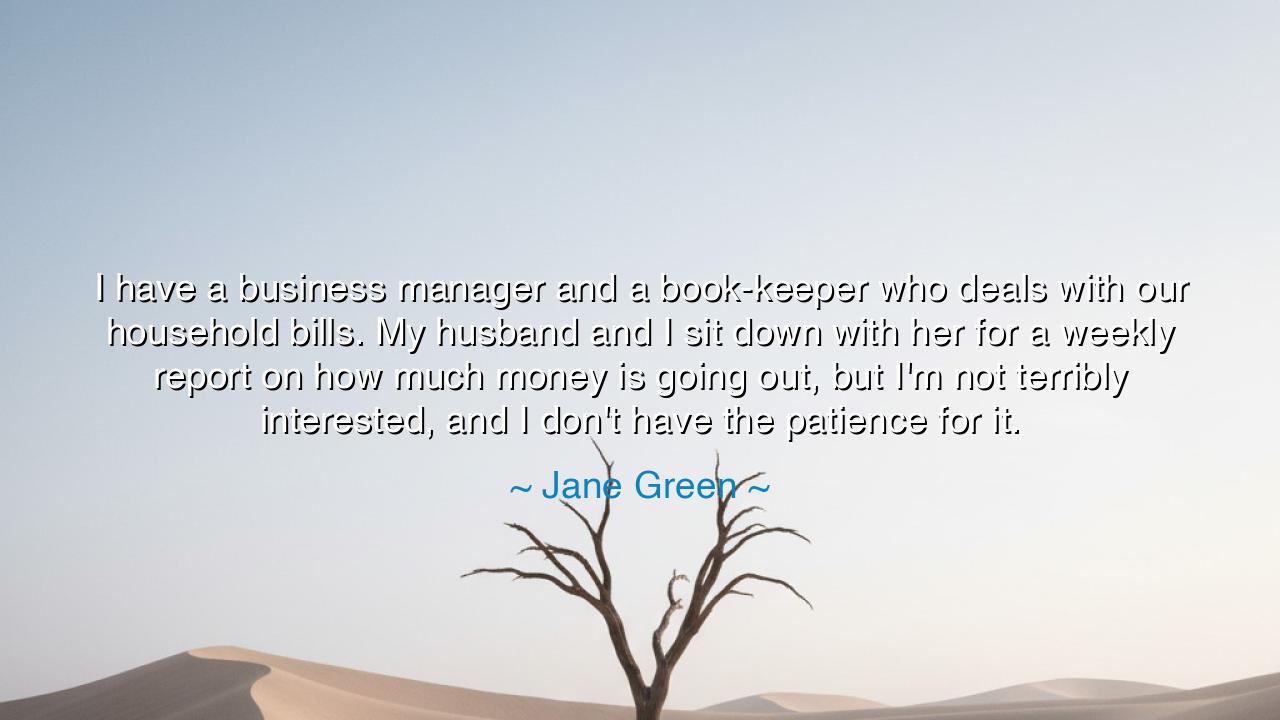
I have a business manager and a book-keeper who deals with our
I have a business manager and a book-keeper who deals with our household bills. My husband and I sit down with her for a weekly report on how much money is going out, but I'm not terribly interested, and I don't have the patience for it.






Hear the candid confession of Jane Green: “I have a business manager and a book-keeper who deals with our household bills. My husband and I sit down with her for a weekly report on how much money is going out, but I’m not terribly interested, and I don’t have the patience for it.” In this humble utterance is revealed a truth both ordinary and profound—that not all are suited to the intricate management of numbers, and that wisdom often lies in knowing when to entrust tasks to others. For to rule one’s life well is not to do all things oneself, but to discern where strength lies, and where help must be sought.
The ancients understood this division of labor. The wise household in Rome or Athens was not run by one alone but by many, each with a part to play. Some tended the fields, some the accounts, some the hearth. The greatness of the household came not from one person’s mastery of all things, but from the harmony of roles, each fulfilling their duty. In Jane Green’s words, we hear the echo of this ancient truth: she has not the patience for the careful tracking of money, so she entrusts it to those trained in the art, that she may give her spirit to other pursuits.
History gives us examples of this wisdom. Consider Queen Elizabeth I of England. She was not always precise in the handling of the crown’s finances, yet she was surrounded by able ministers like William Cecil, who carefully managed the treasury and balanced the realm’s accounts. Freed from the burdens of detail, the queen gave her mind to statecraft, diplomacy, and the inspiration of her people. It was not her weakness that saved the nation, but her wisdom in choosing the right stewards to carry what she could not.
Jane Green’s words also remind us of human limitation. There are those who revel in the columns of numbers, who find joy in the balancing of books, and for them the task is not a burden. But for others, the heart grows restless, the mind weary, and patience dissolves. In such cases, stubbornness would be folly. To cling to what one despises is to sow misery. Better to release the task into skilled hands and to focus one’s energy on gifts that uplift rather than drain the soul.
Yet her statement carries another layer: an honesty about disinterest. Many feel shame in admitting what they cannot endure, fearing that weakness diminishes them. But in truth, such candor is strength. To know yourself deeply—to recognize both your patience and your impatience—is the beginning of wisdom. For the greatest lives are not lived by pretending to master all things, but by aligning one’s path with one’s true strengths and weaving the strengths of others into the fabric of life.
Still, the lesson does not free us from responsibility. Though Jane Green delegates, she and her husband still sit with the book-keeper to learn what passes in their household. This balance is crucial: to entrust is not to abandon. To delegate is not to forget. Just as a captain may trust the navigator yet still consult the map, so too must we remain aware of the stewardship of our own resources, even when we lack the will to manage every detail.
Practical wisdom follows. Know yourself, and know what you can bear with patience, and what you cannot. Do not waste your days forcing yourself to thrive in places that only exhaust you, but neither should you abandon your responsibilities entirely. Seek allies, seek helpers, seek those whose gifts complement your own. In family, in work, and in life, build a circle of trust, and within that circle, each one may flourish according to their strength.
Thus, let Jane Green’s words be remembered: it is no weakness to lack patience for some tasks, but it is folly to ignore them altogether. The wise path is to delegate with discernment, to remain engaged enough to guide, and to spend your energy where your talents truly shine. In this balance lies not only relief, but harmony, and in harmony, the strength of a well-lived life.






AAdministratorAdministrator
Welcome, honored guests. Please leave a comment, we will respond soon